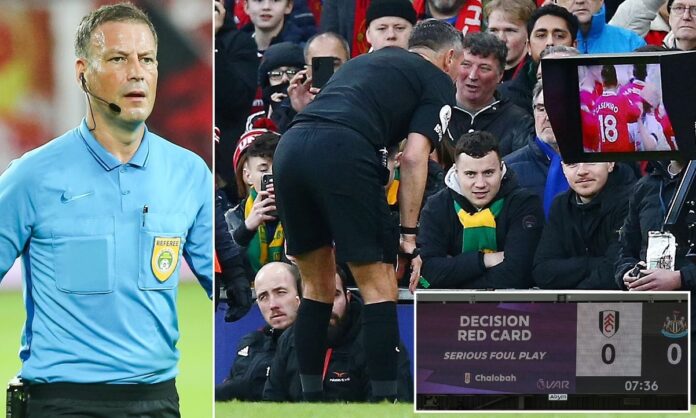In September 2023, referee Simon Hooper commended his staff with the words, “Well done, boys; good process,” after disallowing Luis Díaz’s onside goal for Liverpool against Tottenham Hotspur, despite the obvious error in the VAR room. The incident, which should have resulted in a goal, has since plagued Premier League officials, becoming a symbol on social media for criticizing English refereeing. The word reappeared throughout Euro 2024, demonstrating how deeply it has ingrained itself in the conversation around VAR and officials.
Almost a year later, Howard Webb, the chief refereeing officer, is tasked with mending VAR’s damaged image. However, the problem is great, with supporters becoming disillusioned after five seasons of uneven choices and contentious stoppages. Trust in VAR has degraded to the point that it seems like the struggle for public confidence is all but over.
Webb recognizes the tough battle, especially in light of popular unhappiness with VAR. He emphasizes that some complaints originate only from disputes with final judgments, which are fundamentally subjective and will not always suit everyone. VAR was never designed to resolve every difficult situation, but rather to remedy evident mistakes that had a substantial influence on the game. However, this message has been heard before, and many are wary.
The Premier League’s communication on VAR has also been inadequate, often leaving supporters in the dark during games. The addition of more comprehensive live information to social media and stadium displays is a step forward, but it demonstrates how glacial development has been. The league is now pushing for the notion of a “referee’s call,” to shift the emphasis back to on-field judgments rather than depend primarily on VAR. However, this shift may seem cosmetic, since it ultimately relies on the quality of the referees’ choices.
One of the most common critiques leveled against VAR in the Premier League is the amount of time it takes for reviews. VAR evaluations at Euro 2024 were noticeably faster and smoother, thanks to semi-automated offside technology and the input of Europe’s best referees. In comparison, the Premier League’s procedures may be slow, with some reviews dragging on needlessly. Webb has underlined the need of more efficient decision-making, advising referees not to overanalyze and to act quickly when VAR is required.
However, the root cause is that supporters believe their views are not being heard. If changes do not materialize, fan dissatisfaction will simply increase. In Scandinavia, there has been considerable opposition to VAR, with Sweden’s fan-owned teams rejecting it and Norway seeking a referendum to ban it outright. While a big league like as the Premier League is unlikely to follow suit, the displeasure is evident.
Wolves sought a referendum to abolish VAR in May, but other Premier League teams outvoted them 19-1. Despite the criticism, the league is moving forward with new technologies, including semi-automated offside, which might lessen mistakes and impressions of human fallibility.
However, technology alone is not the answer. The actual need is for better, more consistent refereeing. Currently, just two English referees, Michael Oliver and Anthony Taylor, are on UEFA’s elite list, behind other major European leagues. Despite attempts to speed up the promotion of bright officials, the disparity persists. Webb’s long-term objective is to bring English referees up to the same level as their European colleagues, but this will need substantial work and money.
Finally, Webb’s aim to rebuild confidence in officiating confronts significant obstacles, particularly given supporters’ strong suspicion of VAR. The new season may offer new opportunities, but whether they will be realized remains to be seen.
What is the problem with VAR in football?
One of the fundamental issues of VAR is its zero-tolerance attitude to decision-making, especially with offside rulings. The system’s accuracy allows little space for the on-field referee’s judgment; a player is either offside or not, no matter how small the difference may be.
VAR’s binary nature removes the human aspect of judgment that referees often bring to the game, reducing complicated, fast-paced situations to just lines on a screen. While this accuracy is intended to avoid errors, it also reduces the referee’s authority on the field, making technology, rather than human interpretation, the ultimate arbitrator of the game’s most vital moments.
What does VAR mean in the Premier League?
In the Premier League, VAR (Video Assistant Referee) is a technology system that helps referees review key decisions like goals, penalties, red cards, and cases of mistaken identity. Its aim is to minimize errors by checking for “clear and obvious” mistakes during matches. However, while it enhances accuracy, VAR has sparked debate for disrupting the game’s flow and reducing the on-field referee’s discretion.


